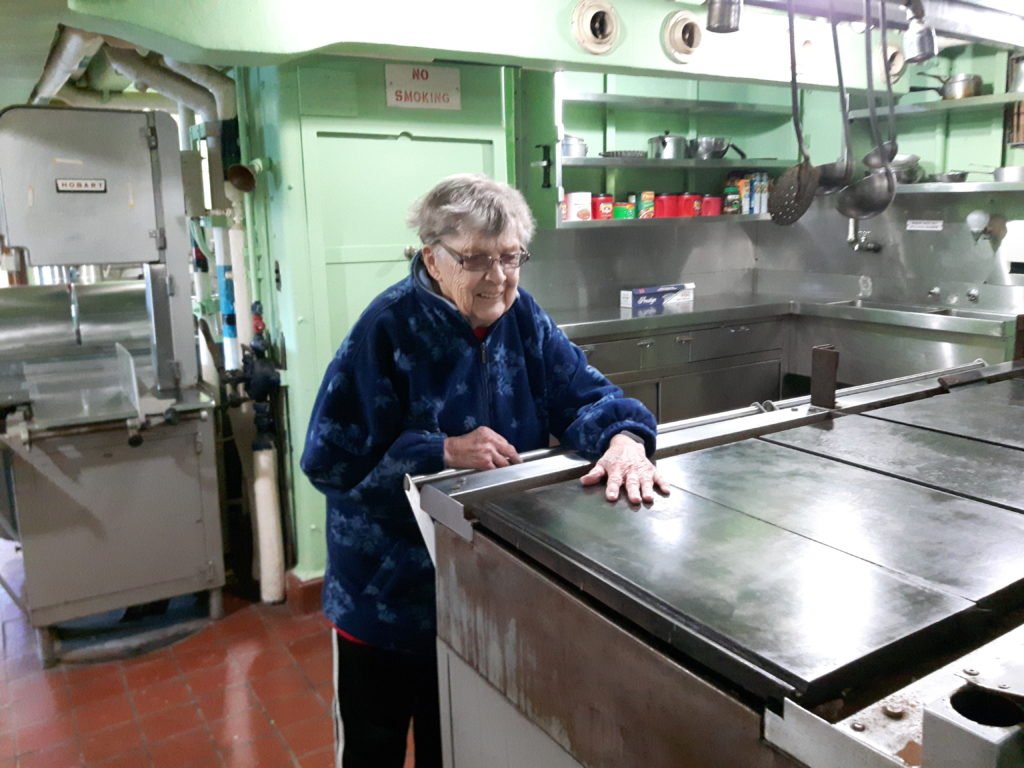Thunder Bay—Annie Kolisnyk went home recently. Not her modest house in Thunder Bay’s south ward, but the 64-metre (210 ft)-long retired icebreaker CCGS Alexander Henry, berthed at the Port Arthur waterfront. The feisty 95-year-old had served on the Alexander Henry as ship’s cook until her retirement in 1984. When the ship was brought to Thunder Bay as a tourist attraction by the Thunder Bay Transportation Museum Society in 2018, Kolisnyk longed to revisit her workplace of nine years. She was present last year to crack a bottle of champagne on the ship’s hull, but she could not board the ship.
“I was crying, though—the ramp wasn’t stable enough for me to go on board,” she says. “But it’s nice to have the Henry home!”
Kolisnyk finally got her wish when the ship, now readied for tours, could accommodate the former cook for her own special visit.

One of Kolisnyk’s stops was the Henry’s compact galley, where she noticed changes even as she reminisced about her working life.
“Lot of the stuff is stainless steel now,” she says. “In my day, the fittings and the cookware were all brass and we had to polish that every day, every week.”
Though never having trained as a cook, Kolisnyk took to her work and the shipboard life like a duck to, well, water. Up at 4:30 a.m., working to feed the crew until 7 p.m. every day that the ship was sailing, she loved the “one big happy family” feeling of shipboard life, and enjoyed looking after the nutrition needs of the crew and officers.
Kolisnyk’s “office” consisted of the galley, with the stove running from one end of the room to the other. Off that room was a fridge “the size of the kitchen,” according to Kolisnyk, with two more cold rooms and more room in the ship’s hold for more food. It was all needed for a hungry crew.
“We spent $8,000 (Cdn) a month on food,” she remembers. “We’d get 30 cases of milk, 24 dozen eggs, 10 2’x18” slabs of bacon. When we took on supplies, a bakery truck would roll up and we’d use 240 loaves of bread!”
Kolisnyk was very popular with the Henry’s crew, not only because she was the cook, but because of her approach to her work.
“I never had a recipe or used canned foods,” she remembers. “I always made the meals from scratch. Never threw anything out, either: if they hadn’t gone bad, I’d throw the leftovers into the next meals. If I wasn’t sure sometimes if I was still doing it right, I’d ask a deckhand to taste for me—they loved doing that!”
On hot days in the steel-hulled craft, Kolisnyk would take a breather in the walk-in freezer. Once, a colleague accidentally slammed the freezer door on her hand. To this day, one of Kolisnyk’s fingers will not bend.
Kolisnyk is a born storyteller and her stay on the Henry has provided her with a rich inventory of tales. One of them has to do with her compact car.
“The deckhands would pick up my car on the dock and lower it into the fore hold,” she remembers. “If we were going to stay for a day or so in one of our dockings, they’d winch it out with the crane, so I could drive it around town. Mary (ship’s steward) and I would go to church if we were there on a Sunday.”
Kolisnyk’s tenure with the Henry ended with both their retirements. During her stay, the Henry had performed multiple duties for the Canadian Coast Guard, ice breaking and maintaining navigation buoys and automatic lighthouses to ensure safe sailing for the Great Lakes traffic. In the days of manned lighthouses, the Henry also acted as a passenger ship for the families who lived at the lighthouses during shipping season. Kolisnyk saw all the Great Lakes and, in the last two years of the ship’s working life, the St. Lawrence River and the Maritimes.
“Lake Superior always seemed to want to drown you,” she remembers. “It could go from calm to rough in just minutes!”
Annie Kolisnyk pauses, smiling, as she touches the walls of her former home.
“When we were in a storm, the deckhands would say, ‘Henry’ll get us through!’ and you know, after the storm, they’d all thank the Henry, never the captain.”

